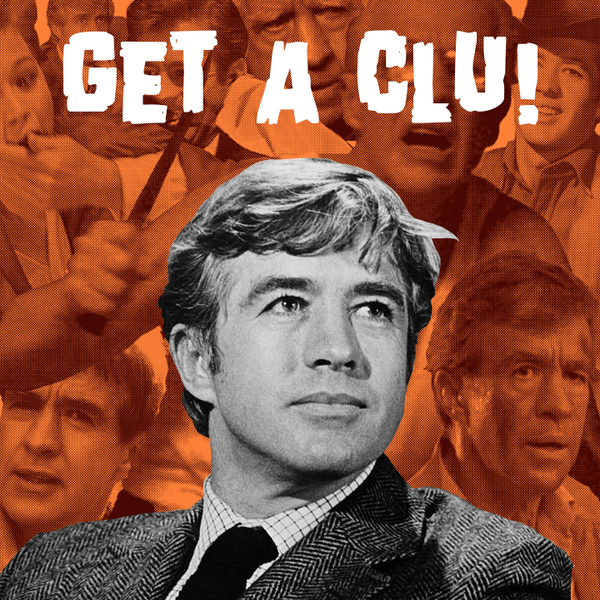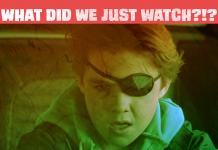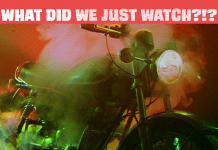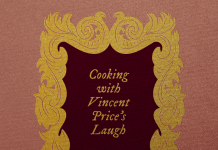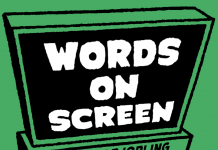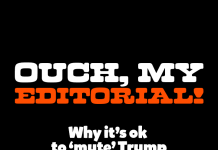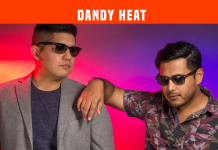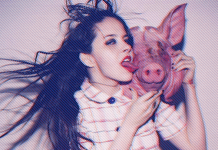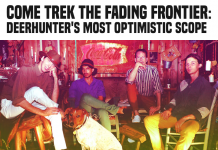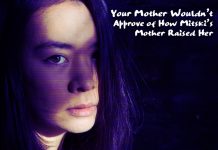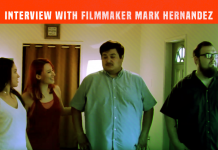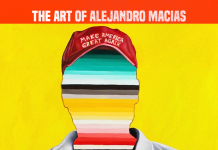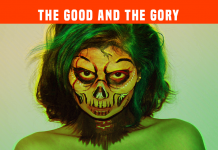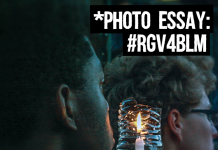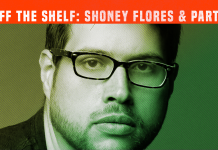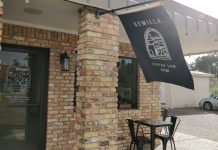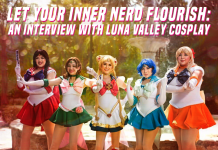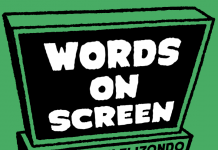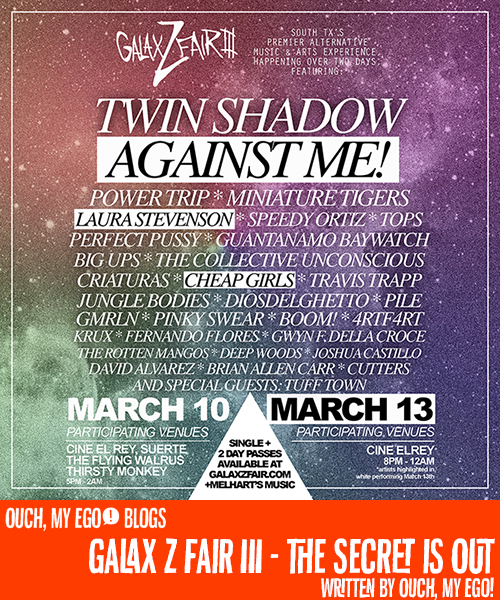The Rio Grande Valley has grown exponentially in the last couple of decades, becoming a south Texas hotspot for art and culture. McAllen, of course has the IMAS Museum and a kickass library – along with some very cool nightspots. Thanks to the efforts of a few different groups of talented individuals, the local music scene is here to stay, and let’s not forget how touring bands have started to recognize the RGV as a worthwhile stop. But one of the things you might not know is that the RGV has a very dedicated cosplay scene.
Cosplay? Yes, cosplay.
The ladies of Luna Valley Cosplay (Victoria, Eva, Leah, Mimi, and Jessica) are probably the most recognizable faces in the RGV cosplay scene. Their striking presentations range from DC Comics heroes to Sailor Moon characters, and every time, the ladies are flawless and fearless. They possess a certain poise that is enviable to me personally, but what’s most impressive is their strong sense of teamwork and the self-evident respect they have for one another.
The five women grew close in high school, and have been virtually inseparable since. They cosplay together, party together, and they’re so close they spend holidays together (Leah’s dad even sets apart special vegetarian portions for a few of them). And part of the reason they are so successful as a group is that closeness. It’s a genuine sense of sisterhood that gives them the ability to persevere.
I had the opportunity to chat with Luna Valley hot on the heels of their first Cosplay Night event at local dive Yerberia Cultura. We talked about creativity and teamwork, where they draw their inspiration, and the importance of transcending criticism and staying positive in a world that can sometimes seem fickle.
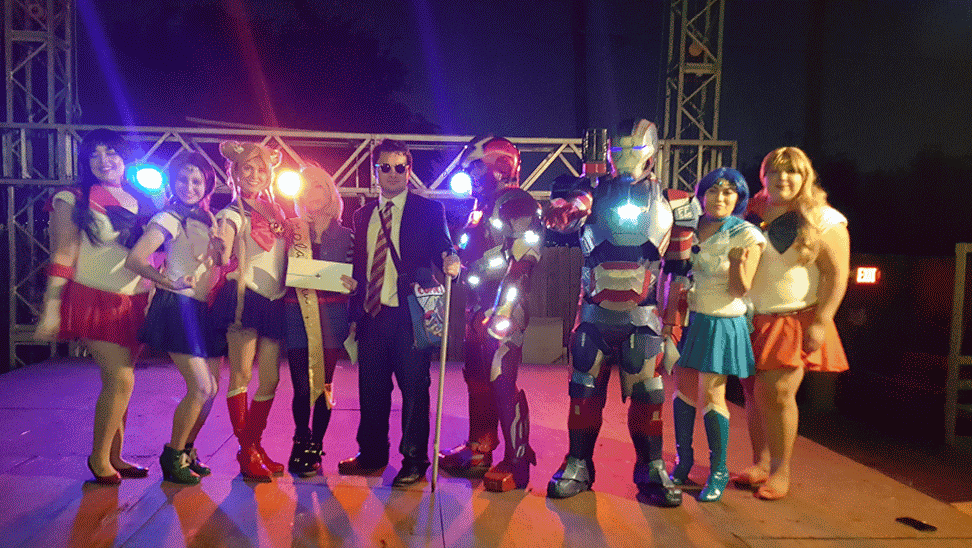
Elbee Bargeron: How do you feel when you’re transitioning from civilian to character?
Victoria: All five of us, we have anxieties – everyone does. I think that for the most part, the fun that cosplay is outweighs those small negatives.
Jessica: I agree with that statement. I sometimes feel it’s easier to “check out” and then come back in slowly as the Con is going. I check out of however I felt before getting ready, and then it’s like all of a sudden I’m happy.
V: You do get really serious when you’re Sailor Mercury, though.
J: (laughs) Because she’s really studious, she has to be.
Leah: I don’t find it that hard to transition – it’s like going from “normal makeup” to “intense makeup.”
V: The process of getting ready is helpful.
L: Yeah, it is transformative.
V: I work in retail – I’m a makeup artist at MAC, and there’s something that I’ve always found therapeutic in makeup. It’s true that when you sit down and you start putting on your wig and getting yourself ready, you’re revving yourself up. Then when you’ve put on all of the parts of your costume, and you’re looking at yourself in the mirror, you’re like, “Okay, let’s do this.”
EB: So it’s a creative thing that you all pump yourselves up for. How does that creativity come out in your cosplay?
Mimi: I didn’t know how to sew, or anything like that. But you guys had sewed before. My original thought was “Oh, we’re buying (the costumes).” So I started looking on Etsy. And then you were like, “No, we’re making them.” Thinking about it, it was exciting.
V: I think how we met in high school – we all were in some kind of creative thing: choir, art, band…we all were artistic in some way. I think it was easy for us to get excited. Sometimes when you’re in college, or in your career, and you’re doing something that maybe isn’t something you always wanted to do, you need to find that creative outlet, and that is what was so perfect for all of us. It’s been a roller coaster.
EB: I think that’s something a lot of young people have to do these days. That’s kind of what we’re doing here at OME.
L: I remember one time I was working in retail – and that’s some really soul-sucking work – I was also going through a really rough time in my personal life, so I think this really got me out of that headspace, and helped me to be a “normal person” (laughs).
EB: So you feel like it is healing in a way.
L: Yeah, it takes you out of your daily whatever, and gives you something more creative. It’s artistically liberating.
EB: Had you always planned to be professional? Was this always a business to you?
All: Ohh, no!
Eva: When we started, it was just for Halloween.
EB: As far as the competitions go, how crazy are they? Is it something you feel like you can just kind of breeze through, or is it a more cutthroat type of thing?
L: It’s not cutthroat, it’s more of…we get very nervous before we’re going on stage. I think we all have a little bit of stage fright because we’ve put so much time and so much effort into making these costumes.
V: You never know what they’re going to react to.
L: Every Con is different. Every judge has a different bias, and you never know exactly how you’re going to be judged. We do get nervous, but at the same time, the con-goers are extremely friendly and very supportive.
V: When you’re walking in and you’re waiting in line – usually these Cons have a long line of cosplayers – you talk to each other like, “Wow, your costume is really good! What did you use to make that?” So it’s not cutthroat necessarily, it’s more a bit of making friends. We’ve made friends here in the Valley just by competing. At our level, it’s not cutthroat at all. Everyone’s just doing it for fun.
There’s a lot of people like that at conventions. There are the ones who are going to heckle, but there are a lot more who are going to be supportive and give you genuine advice.
J: All the judges are always different, so sometimes you’ll have a judge who’s really well known for doing armors, so they have that bias. Or other judges who are good with props, or embroideries. So depending on who the judge is, they know exactly what they’re doing with their stuff.
V: The first Con that we ever went to and competed in, the reason why we even went was there was a guest artist – she’s a comic book artist, and we all like her work, Cara McGee. So we all decided to go. That was our first competition, and we won.
E: That judge really admired our stitchwork and attention to detail.
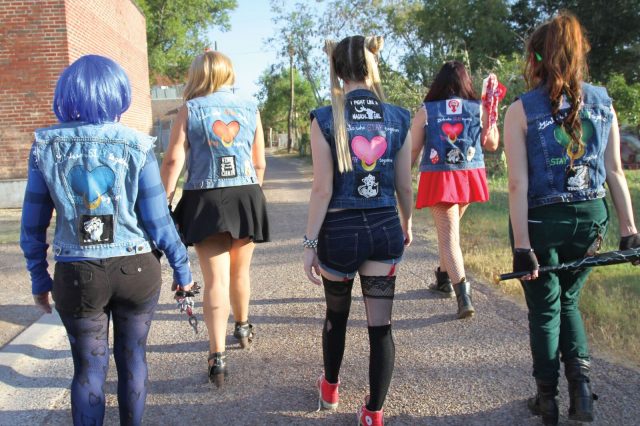 L: It did get heavy, though, for just a second because one person had said we had bought those costumes, and we had to be like, “No, we didn’t!” And that judge was the one who had to talk to that person and say, “No, I looked at their stitches, I can tell those are handmade.” He was very helpful, and we were very grateful for that. And that sort of led us where we should go. There’s a lot of people like that at conventions. There are the ones who are going to heckle, but there are a lot more who are going to be supportive and give you genuine advice.
L: It did get heavy, though, for just a second because one person had said we had bought those costumes, and we had to be like, “No, we didn’t!” And that judge was the one who had to talk to that person and say, “No, I looked at their stitches, I can tell those are handmade.” He was very helpful, and we were very grateful for that. And that sort of led us where we should go. There’s a lot of people like that at conventions. There are the ones who are going to heckle, but there are a lot more who are going to be supportive and give you genuine advice.
V: Every single Con we’ve gone to we’ve gotten difference advice from different people, and I can say that every piece of advice has helped us get to where we are now.
E: And we try to do a good job of doing the same. At the event we had (at Yerberia Cultura), one of the girls was having a bit of anxiety, and we were talking about some of the techniques we use to keep people’s hands to themselves. We told her about a thing Jessica had come up with that whenever we’re about to take a photo, we say, “Okay, everybody get in your fighting stance!” and they put their hands up, so their hands aren’t “down here,” they’re “up here.” And she was like, “That’s such a great idea!” It’s just the little things like that – we try to be supportive and help everyone.
V: I think that what you do that’s good, it comes back. So, do good.
There’s always criticism, and it hurts sometimes, but ultimately, it’s like, “Who cares?” I accept myself for who I am.
EB: How does cosplaying empower you?
E: The characters that we chose all have something that each of us admires. When I chose Sailor Jupiter, she represented everything that I wasn’t. She’s strong and confident and chill, and she makes me feel like a cooler and stronger person.
M: We try to build up the community because it’s hard work doing this, and we all have insecurities. And It really helps you become comfortable with your own body. People are very accepting.
V: There’s always criticism, and it hurts sometimes, but ultimately, it’s like, “Who cares?” I accept myself for who I am. I’m the Princess of Mars, don’t tell me anything!
All: (laugh)
L: Yeah, for every one negative comment, there’s ten positive ones.
E: Now that you mention it, it’s kind of weird that since I’ve been in the comic con world, I’ve seen so much less criticism than I did when I was in acting. The criticism is so much more positive and constructive than it was in theater.
M: Overall, we’re there to have fun. And so is everyone else.
V: Cosplay has really grown. Like, right now there’s a movement, Cosplay Does Not Equal Consent. And also, #FakeGeekGirl, which I think was about two years ago, even though that one is kind of negative, that draws attention to cosplay to turn it around in a positive way. So, since those kinds of events and movements, it’s a lot more open and welcoming. I appreciate other cosplayers who have been veterans of the cosplay scene, they struggled through it. And now – we’ve only been doing this since 2014 – they kind of paved the way for us.
E: And it is nice. Once in a while, you’ll get those people who will heckle.
V: Or the people who don’t understand the Cosplay Does Not Equal Consent, they’re living in the past. And the rest of us are over here in the future. And we all have each other’s backs on that.
EB: Do you all get catcalls or that type of thing?
L: Usually it’s people who are outsiders. Not in the conventions.
E: Walking into the convention, or leaving, yeah.
M: We’ve gotten all kinds of weird looks trying to get coffee before we get to the convention.
E: It’s really just people who are not familiar with it. The people who go to the conventions, the fans, they get it already.
L: It’s very normal to them.
V: Cosplay is something that’s fun, but a lot of people on the outside might have this specific negative idea about it that isn’t what it is at all. Just go to the convention and enlighten yourself.
J: That’s something that I’m not sure y’all want to talk about, but I think it matters because we want to break people from thinking it.
E: We can just say it.
V: Okay. I do think that some outsiders fetishize cosplay. It’s not a fetish, dude. It’s freaking geek thing!
L: Those two things are very separate. There are, like, bedroom costumes (laughs), but I’m not going to put that much effort into something like that.
All: (laugh)
E: It’s ridiculous!
J: It’s like, really?! It takes two and a half hours to put this costume on, I’m not comfortable when I’m wearing it, and it’s not easy to take off.
L: There are so many layers of Spanx and tights….(laughs) That’s not bedroom time.
V: It is not sexy up close! That’s one thing that I think people who are unfamiliar just don’t understand.
L: They’re like, “Oh, so y’all are freaks!” (laughs)
V: No! We’re just nerdy.
Definitely to cultivate the friendship, we’ve had to learn to communicate and work together. And make sure everyone’s stress level is down.
EB: I want to ask you about your teamwork. How do you all build each other up?
M: As we’ve learned to work together, we’ve learned each individual’s artistic style. And we try to compliment each other and work in a way that we all know how to work.
L: We all have different processes.
M: Yeah and we all try to show each other how we’re thinking about something and bounce off each other, especially when we’re kind of blanking on how to do something. How we build each other up is, we really compliment each other.
E: Sometimes you focus too much on the negative, and that’s just not going to get you anywhere.
V: We all have our own support systems aside from this, but we’re all best friends. When we first started out, we focused on the negative. But we learned that’s not something we can hold onto; we need to be all positive. Because at the end of the day, we’re still going to be friends.
M: Definitely to cultivate the friendship, we’ve had to learn to communicate and work together. And make sure everyone’s stress level is down, that everyone is working up to par professionally. We’ve also learned how to take criticism. Because sometimes our costumes are like our babies, so we’re very protective of our ideas. But sometimes it’s also good to let go.
L: It’s sometimes hard to step back and look at the big picture instead of focusing on little details. I’ve been told on more than one occasion that I’m a perfectionist. I get tunnel vision. I get super caught up in little details, and it’s really important to take that step back, take a breath and a sip of coffee.
V: It’s about knowing each other’s quirks or vices or whatever, but then being able to say,
“But you’re really good at this!”
J: When we were looking at designs for the upcoming Pokefest, I was having trouble seeing it come together. And you all pointed out, “Yeah, but Jess, you don’t see it. That’s not your strong suit.” I have trouble taking things from paper concept to…if it’s in 2D, I can’t bring it out. It looks flat to me.
L: We know how to push each other’s buttons, but we also know how to help each other out.
E: And we’re still working on it. It’s a balance of having that accountability and responsibility to each other because it’s not just each of us alone. We’re working on something that’s representing all of us. But at the same time while you have that responsibility and accountability, you also have that comfort that you’re not alone. It’s never a situation of “Well, I guess I just have to deal with this myself!” If we’re struggling, we’re here to help each other. And it’s a great balance.
L: We keep pushing each other. For every convention, we want to do better. We want to do more. We want to fix these seams! There’s always something to improve on.
V: We work together well because we care for and love each other.
All: Awwwww!
L: It’s kind of cheesy, but you guys are my chosen family.
EB: You all have different characters you like to play – like the Sailor Moon characters – that inspire you in different ways, what are all the characters that inspire you?
J: Oh, I have so many! Definitely Aang and Zuko from Avatar: the Last Airbender, and Cora from Avatar: Legend of Cora. And Veronica Mars! I love Veronica Mars. And I love Arnold from Hey, Arnold!. For real, I grew up watching Arnold, and I love everything about that show. The messages, everything. Arnold’s just so cool, calm, and composed. And he can assert himself and do the right thing. I wish I had his moral convictions (laughs).
V: I really like comics. Spider-Man is my jam. I have him tattooed. I also have Thor’s hammer on my leg. All of those characters, especially Marvel characters, they inspire me. Today this guy commented on a post of mine saying that Captain America was pro-Trump. I was like, “I’m sorry, but 100%, that’s wrong. Captain America is NOT pro-Trump. I’ll tell you what Captain America is fighting for! It’s something else, man!” (laughs)
M: Read “Civil War.” (laughs)
V: So I think those characters like Peter Parker, Spider-Man – I love Spider-Man because he gets faced with having to make the tough choices and doing what’s right. And those kind of characters, I think it’s because I have such little self-control and I’m very reactionary, those kinds of characters inspire me forever because I wish I could be like that. To do what’s right, always.
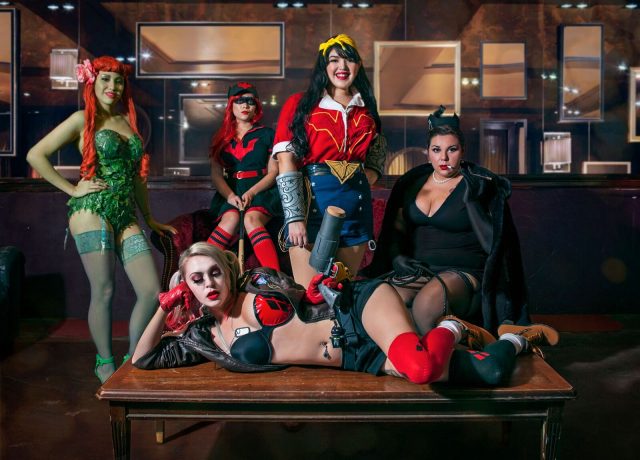
E: I’ll talk about Poison Ivy a little bit. Before we did DC Bombshells, I did Poison Ivy for a Halloween costume. I like her because, well, technically she’s a villain, but what she stands for is strength. She’s got lots of sass and doesn’t let anyone tell her what to do. And I think that’s really admirable, her gumption.
L: I really admire Sailor Moon because she isn’t always a strong leader. She brought the Sailor Scouts together with her loving personality. She’s a very sociable person, and she has a very sweet and kind heart. She’s a very caring person. I feel like I can really relate to her because I feel like I’m not a leader. I don’t want to put myself there, not in positions of leadership. But when I have to, I can step up to the plate and do what needs to be done. She does still have that soft side, that goofy, klutzy side that I also relate to.
M: Everyone says Sailor Venus fits me really well. She was kind of on her own before in the manga, and she has kind of stepped back a bit, hanging in the background. Why she inspires me is that she isn’t the leader. She’s there in the background supporting them, and the rest of the Sailor Scouts know they can count on her no matter what. She manages logistics, and in many ways that is me, wholeheartedly.
E: She’s the voice of reason!
V: The character is very fitting for you. Sometimes I’ll just call Mimi so she can tell me what to order (laughs). “Who I should call to have them tell me what to do?” It’s Mimi. Totally the voice of reason.
E: Mimi always has the perfect solution!
All: (laugh)
All of the things that were nerdy before are now common knowledge. So, how are you going to feel embarrassed by something that’s now so normal?
EB: Are there any characters you want to do that are guilty pleasures or are embarrassed to admit you want to do?
V: I think cosplay by itself is kind of nerdy, and it would be embarrassing to someone. So I feel like if we were going to be embarrassed, it would have already happened.
E: Especially in my armor, having to walk around kind of sideways. You have to kind of crab-walk sometimes.
J: As soon as I like something, I want to do it. I have no shame (laughs).
M: Sometimes it’s funny to you to be embarrassing. Because we embrace it, obviously. We’re a part of this community, we’re sort of prepared for that.
E: We stop thinking of it as a stigma, and it’s something that we welcome.
V: All these big ComicCons – New York, San Diego – and with the Marvel Universe and that stuff, it’s pop culture now. All of the things that were nerdy before are now common knowledge. Like, my grandma will go see the new Avengers movie. It’s mainstream. So, how are you going to feel embarrassed by something that’s now so normal?
M: Yeah, and I think even further than that, cosplay itself has become more a part of pop culture with shows like Heroes of Cosplay. My mother-in-law went to this last Con because she loved Heroes of Cosplay. She’s nerdy in her own way, but she went just to see all these beautiful things that everyone built because she’s been watching it on TV and seeing all the work that goes into it.
J: And Chris Hardwick basically created this whole brand of nerds, and people like Joss Whedon and Felicia Day…The Big Bang Theory, too. Even if it’s just like someone namechecking Doctor Who, it’s bringing in people who wouldn’t have otherwise known about this stuff.
V: So with that, I don’t know if there’s room for shame anymore.
EB: What do you hate being asked? If someone approaches you who might be an outsider or might not, is there anything that just gets to you?
E: The first Halloween we did costumes for – we weren’t officially cosplaying yet – they were literally just costumes we had made. We were at a Halloween costume contest, and for me, I thought we were a shoo-in because one, we made our costumes, and two, there were ten of us at the time. So, we go in and we lose to a dude and bro being Forrest Gump and Lieutenant Dan! And we were like, “Are you kidding me?? They’re wearing t-shirts and baggy pants!” So we were leaving, and we were kind of disgruntled, and we were stopped for pictures. The lady who stopped us took about five pictures, and then wanted more, but it was like two in the morning and we were tired, and just wanted to leave. When we told her we needed to go, she got upset and said, “You wanted to be seen! You went and bought those costumes!” And we were like, “No, we did not,” and just walked away.
J: We really don’t like when people assume that our costumes were bought.
M: Very true.
L: People make the assumption that since you’re wearing a costume, you just want attention.
E: That’s the “Fake Geek Girl.”
V: But you know, in cosplay there aren’t any rules. You can buy your costumes, or commission them, that’s fine.
E: But when you do make them, that assumption hurts.
J: One thing I don’t like is when someone asks like, “Hey, do you like this show?” and I’m like, “Yeah, I love it!” and then they say, “You guys should do that! But, like, the sexy version.”
All: (groans)
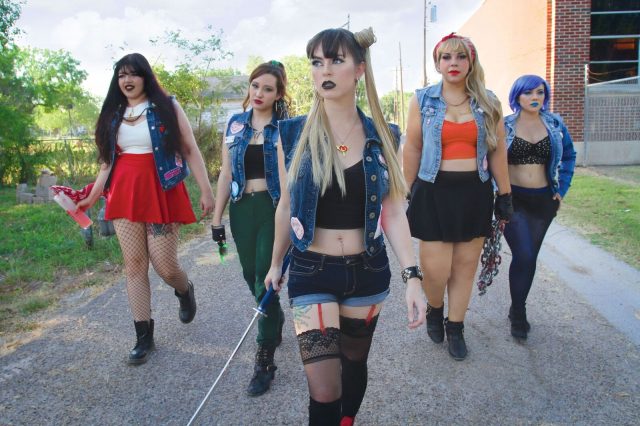 L: My “favorite” one that we get asked is, “Your boyfriends let you dress like this?”
L: My “favorite” one that we get asked is, “Your boyfriends let you dress like this?”
M: Or, “Are your boyfriends okay with it?”
L: It’s like, “Yes, our significant others are very supportive of us. They wouldn’t be our significant others if they weren’t.”
V: They put the emphasis on “let.” No one lets us do anything but ourselves.
L: I think that’s the one we really hate the most. If you want to set me on fire, ask me that. But it could also be something personal like where we live or how old we are.
M: We say, “I live on the Moon, duh.”
All: (laugh)
E: Sometimes I think it’s the costumes that we’re wearing or the costumes that they’re wearing that kind of emboldens them to ask questions that are inappropriate.
J: When that happens, sometimes I just have to walk away. Sometimes it’s not a teachable moment. I’m just outta here.
We all have to demand inclusivity and diversity, otherwise it’s not going to happen.
EB: I’ve been reading a lot about a complaint that’s happening in the cosplay world that women – especially women of color – receive criticism for dressing up as someone who’s not their race or someone who’s not their body type – how do you challenge that or get over it?
V: If we’re going to be super isolating, none of us could be a single anime character because they’re Asian.
J: Not even just (anime), but a lot of characters in movies and TV and comic books. I’m Hispanic, a light-skinned Hispanic woman who looks kind of Asian, and you’re not going to necessarily see that in a cartoon or a TV show or a movie.
E: A lot of us aren’t represented.
M: Yeah, we’re not.
J: And I mean, I think it’s BS to say, “Hey, your body type doesn’t fit the standard” or your race or your ethnicity, your cultural influence, your gender, your whatever-the-heck, your identifier…how you identify yourself doesn’t always fit in to media. I personally want to take the characters that I like – and I like them for who they are, not necessarily what they look like – when I pick those characters, it’s like, “why can’t anyone else do it?”
L: I feel like cosplay is more about taking the aspects of the character that you want to portray within yourself as yourself. Like, I’m not Sailor Moon. I’m Leah as Sailor Moon. I’m still going to be myself and act the way I act, look the way I look. I’m portraying this character in a way that I feel fits my personality. It’s something positive.
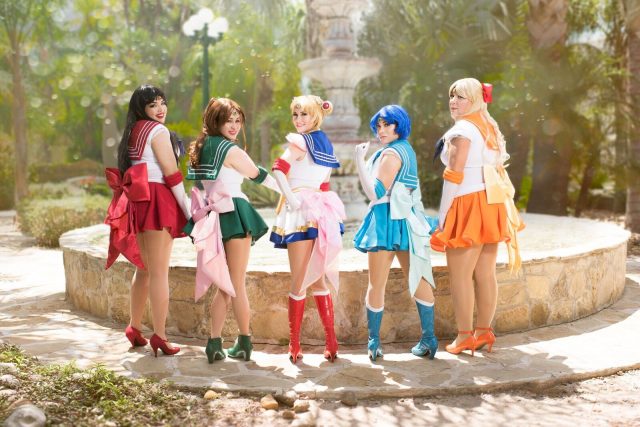 V: I’m plus-size, I’ve always been plus-size. Sometimes there’s the thing where people say stuff like “the Fat Sailor Mars.” Dude, if Sailor Mars saw me, she’d tell me I was badass. We’re both out here fighting injustices! You know what I mean? Like Jessica said, nothing is stopping you. You’re embodying the character, and your size doesn’t matter. I don’t think anything like that should stop you from cosplaying anything, ever.
V: I’m plus-size, I’ve always been plus-size. Sometimes there’s the thing where people say stuff like “the Fat Sailor Mars.” Dude, if Sailor Mars saw me, she’d tell me I was badass. We’re both out here fighting injustices! You know what I mean? Like Jessica said, nothing is stopping you. You’re embodying the character, and your size doesn’t matter. I don’t think anything like that should stop you from cosplaying anything, ever.
L: Don’t limit your options. If you only cosplay people that look like you, there’s so many limitations.
J: And it would be very stereotypical and racist if we wanted to continue to hold those things back. Yes, comics in general have been trying to be more inclusive, but it’s still not there yet. It still doesn’t represent the population.
V: Chelsea Cain is a comic book writer who was writing Marvel’s Mockingbird, and it had gotten cancelled. It had gotten some bad feedback supposedly because of the female writer. And this is 2017. We actually made shirts that said, “Ask me about my feminist agenda,” because of the last cover of Mockingbird. We made those shirts in support of Chelsea Cain. Like Jessica said, we may have come far, but we’re still not there yet in a lot of aspects, even in just writing. Society has media in this certain way, and we have to, as cosplayers and writers, musicians – anybody having any say in media – we all have this responsibility to break that.
L: We all have to demand inclusivity and diversity, otherwise it’s not going to happen.
V: And I think, us, just cosplaying…I feel like me, plus-size, cosplaying Sailor Mars, I don’t hashtag plus-size. I am just Sailor Mars. That’s just who I am; that’s my act of rebellion. That’s me breaking your mold. Because I am who I want to cosplay, and I’ll keep on cosplaying whoever I want, whenever I want, however I want.
M: I think that usually when you get those questions, those criticisms, the biggest criticism is when people of color cosplay based on someone who is white. Obviously that’s the biggest one. And we’ve been talking about plus-size, and as Hispanics, many times people with darker skin have it even harder. My own experience is, it’s hard to be plus-size, but it’s even harder to be a person of color and be plus-size.
E: There are so few heroes with dark skin. All the villains have dark skin.
M: What I would say is that I think it’s no one’s place to tell you what you can and cannot do, where you can and cannot be, who you can and cannot like. And cosplay – the cosplay community – is inclusive. And we’re okay with it. We embrace it. I think the critique and the ugly comments come from the people outside of cosplay. People who never dress up. So it is important to ask questions like that, and say that, because there’s an underlying idea that we have to be “passing,” that we have to be looking like the character, or to be sexy, for the large population to think that we’re “cool.” But cosplay the community embraces it. The critiques have nothing to do with the community. So maybe people who are skeptical, I would hope they would get to know people in the community and find out that we’re cool with you. It’s the rest of the world that has the problem.
E: Even the idea of what we understand cosplay to be, putting those restrictions on someone is just, like, anti-cosplay.
M: One of the biggest things people like is gender bending, and we are all about that.
E: And again, just going specifically to the black community, if we did only stick to our own cultures, what would they have? There’s so little. There’s not enough representation of all of the races.
EB: What kind of words of encouragement do you have for someone who is interested in cosplay, but might be a little shy?
J: It’s easy to say, “just do it,” but really it’s whatever feels comfortable to you. If you don’t want to go all out, do a casual cosplay. Wear a t-shirt. Do whatever you feel comfortable doing. No one’s going to judge you as harshly as you judge yourself.
V: That’s true.
J: So honestly, if you decide to cosplay and go to a convention, more than likely everyone is going to be like, “That’s so awesome!” You’re going to get pictures, and it’s going to be a good time. Do whatever you need to do to feel comfortable. If you’re not there yet, I mean, push yourself if you feel like it, but if you don’t, then don’t.
M: Something I think also, which is very relevant to us because we’re a group, and we usually cosplay together – to the people who are shy or have anxiety, I would take a friend. Take your cousin, your mom – someone – with you, and feel that support.
V: If you feel intimidated, that’s in you. You feel that in your brain. And then you go there, to that intimidation place. Everyone has their anxieties and insecurities, and we all need a friend. You have a friend! Luna Valley Cosplay, we’re your friends! You come over to us, and we will be there to support you. That’s one thing that I’ve always wanted, whenever people message us. I always tell them, you come to our table, you find one of the Luna Valley girls, and we can relate to you or we will make you feel comfortable in some way. We are there for you. ♦
Luna Valley Cosplay will be appearing at the upcoming ZiCon event in Edinburg, as well as the RGV Pokefest. If you’d like to learn more about the group, check them out on Facebook or visit their Instagram page.


